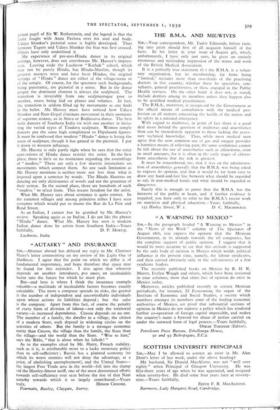AUTARKY " AND INSURANCE
Sta,—Absence abroad has delayed my reply to Mr. Clarence Hatry's letter commenting on my review of his Light Out of Darkness. I agree that the point on which we differ is of fundamental importance, and hope therefore that space may be found for this rejoinder. I also agree that whoever depends on another introduces, pro tanto, an incalculable factor into the future for which he must plan.
But—and here is where I think the insurance example valuable—a multitude of incalculable factors becomes exactly calculable. The more a company spreads its risks, the greater is the number of independent and uncontrollable individuals upon whose actions its liabilities depend ; but the safer is the company. Apart from this fact, of course the penalty of every form of division of labour—not only the territorial variety—is increased dependence. Crusoe depends on no one. The member of a family, the dweller in a village, the citizen of a modern State, each depend in widening circles on the activities of others. But the family is a stronger economic entity than Crusoe, the village than the family, the State than the village—and the world than the State. " Woe to him," says the Bible, " that is alone when he falleth! "
As to the examples cited by Mr. Hatry, French stability, such as it is, is attributable more to a lucky monetary policy than to self-sufficiency ; Russia has a planned economy (to which its worst enemies will not deny the advantage, at a price, of abolishing unemployment), and the United States— the largest Free Trade area in the world—fell into the slump via the Hawley-Smoot tariff, one of the most determined efforts
towards self-sufficiency ever seen before the rise of that Nazi autarky towards which it so largely contributed.—Yours
truly, HONOR CROOME.
Pearmain, Ruxley, Claygate, Surrey.


































 Previous page
Previous page